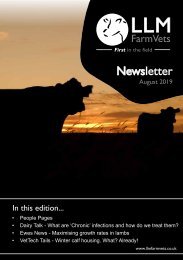LLM Farm Vets Newsletter June 2019
this month we’re trying to do our bit with the global plastic problem - every little helps. Rob Howe gives us a very in-depth look at why dung beetles are good for farms. Dan Stevenson discusses scab in Ewes News and Steph highlights the benefits of worm egg counts towards combating wormer resistance. We hope you enjoy! And as always, any questions, give us a shout.
this month we’re trying to do our bit with the global plastic problem - every little helps. Rob Howe gives us a very in-depth look at why dung beetles are good for farms. Dan Stevenson discusses scab in Ewes News and Steph highlights the benefits of worm egg counts towards combating wormer resistance.
We hope you enjoy! And as always, any questions, give us a shout.
You also want an ePaper? Increase the reach of your titles
YUMPU automatically turns print PDFs into web optimized ePapers that Google loves.
parasites & therefore animal<br />
diseases, which further reduces<br />
need for treatments)<br />
• They are FREE!<br />
Money Saving Experts<br />
Dung beetles are estimated to save<br />
the British cattle industry £367 million<br />
a year, primarily by encouraging the<br />
growth of healthy grass 1 . Compare<br />
this to what is often quoted as the UK<br />
annual cost of BVD at £40 million a<br />
year and it is quite staggering!<br />
The true value of dung beetles is<br />
likely to be even higher than the<br />
estimate above, because despite<br />
many assumptions in modelling,<br />
they provide more services that were<br />
not included in this model such as;<br />
flood mitigation, increased carbon<br />
sequestration, increased biodiversity<br />
& reduced reliance on expensive<br />
wormers, fertilisers & pesticides.<br />
Under Threat<br />
You may have heard the news<br />
stories about rapidly declining insect<br />
populations. Dung beetles are in<br />
decline and like bees, are absolutely<br />
critical to farming productivity and our<br />
ecosystems.<br />
The use of avermectins is one of the<br />
biggest problems for dung beetles, and<br />
therefore, the benefits they provide to<br />
us. Check out your cow pats and see<br />
how many holes appear within a couple<br />
of days. They should be riddled with<br />
holes if you have a good population of<br />
dung beetles.<br />
It is likely these products will be<br />
subject to further legislation and<br />
reclassification in the future, so if you<br />
use them, it would be as well to begin<br />
to think ahead now.<br />
Fortunately there are plenty of effective<br />
alternatives available, many of which<br />
are also cheaper. Changes in chemical<br />
use could save a potential extra £1.36<br />
- £4.36 per cow each year according to<br />
the study cited earlier.<br />
What can you do?<br />
Remove unnecessary treatments.<br />
For example adult dairy & beef cattle<br />
should be immune to gut worm burdens<br />
so avoid treating adults. According to<br />
studies, simply not treating adult beef<br />
cattle for gut worms would save British<br />
farming an additional £6.2 million a<br />
Unfortunately, the active ingredients<br />
in many convenient ‘pour-ons’<br />
(avermectins) can be lethal to aquatic<br />
life, birds, and many insects including<br />
the critically important dung beetles.<br />
Not only are these active ingredients<br />
lethal at very low doses, but they also<br />
stick around in the environment for a<br />
long time.<br />
1 Source: Dr S Benyon, University Aberystwyth, published<br />
research in the journal of Ecological Entomology)<br />
11





